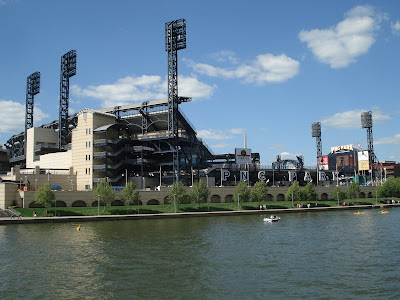http://www.pittsburghlive.com/x/pittsburghtrib/sports/
Thursday, July 16, 2009
Some of us are willing to give the Pirates' latest administration a chance.
We happen to agree with their method of building from the bottom up. (Notice we did not say rebuilding, as that would imply something of significance had been built in the recent past.)
 We have seen encouraging evidence. The Pirates have more than doubled what the previous administration spent on the draft and tripled the international budget, according to team president Frank Coonelly.
We have seen encouraging evidence. The Pirates have more than doubled what the previous administration spent on the draft and tripled the international budget, according to team president Frank Coonelly.This is the only sensible way to make a long-term winner out of an organization that was nearly bereft of prospects a few short years ago.
But it comes at a price.
The current product must be sacrificed in order to make way for a better future, or at least the hope of a better future.
We'll see if this administration is any better than the past few at projecting young baseball players. We'll see if it is willing to raise payroll to $70 million or more, when the time is right, to try to field a winner.
In the meantime, the Pirates stink again, which leads us to the subject at hand: This franchise, despite the fact it has not increased ticket prices for seven years, has no business even considering a price hike for next season.
Not by a penny. Not by half a penny.
The topic arises because of a quote in Wednesday's Trib. Lou DePaoli, the Pirates' chief marketing officer, was asked about the possibility of a price hike in 2010.
"We're starting to look at that now," DePaoli said. "The prices have to go up at some point. I'm generally aggressive when it comes to that, but you have to be realistic. We're in one of those precarious situations where if you get aggressive, it can really backfire on you."
Oh yes, it can. The Pirates found out as much following their famous price hike of 2002, the one that piggybacked a 100-loss season in the first year at PNC Park.
The lesson here was, never kick a fan base when it's down.
The Pirates had drawn 2.4 million fans in their inaugural season at the beautiful ballpark that was supposed to change everything, but that figure plummeted to 1.78 million in 2002 and hasn't yet risen back to 2 million.
 Considering the Pirates are third-to-last in the majors in attendance, fans obviously have not bought into the newest plan. Rather, outrage has greeted nearly every trade of the past year. Most of those trades have seen players making a healthy wage exchanged for cheap prospects.
Considering the Pirates are third-to-last in the majors in attendance, fans obviously have not bought into the newest plan. Rather, outrage has greeted nearly every trade of the past year. Most of those trades have seen players making a healthy wage exchanged for cheap prospects.In that kind of climate - not to mention a horrible economy - just imagine the fury if the club were to announce a price hike for next season.
True, the Pirates have the cheapest ticket prices in the league. But that is as it should be.
It's also true that no other team has frozen prices for the past seven years.
Again, as it should be.
Maybe the Pirates should keep their streak of wage freezes intact until their streak of losing seasons ends.
I asked Coonelly yesterday about the possibility of a price increase for 2010. He said no decision had been made and that the organization was only beginning to study the matter. I mentioned the 2002 debacle, of which he was well aware.
"We understand the history quite well," Coonelly said. "We also understand, however, that we're the only team in the past seven years that hasn't raised ticket prices once. At some point, if we're going to be a successful organization in Major League Baseball, we're going to have to raise ticket prices."
I countered by repeating that last sentence, substituting "payroll" for "ticket prices."
"I think those two are related," Coonelly said. "I wouldn't disagree with that."
The question then becomes: Which comes first, a significant rise in attendance or payroll?
"Do we need to see attendance jump before spending money? The answer is no," Coonelly said. "But we need to build at least the core of a competitive team the fans believe in before we simply spend money."
 We discussed the Milwaukee Brewers, who also moved into a new ballpark in 2001, made horrible decisions on contracts and imploded. The Brewers scaled payroll back dramatically before good drafts put them on the track toward contention.
We discussed the Milwaukee Brewers, who also moved into a new ballpark in 2001, made horrible decisions on contracts and imploded. The Brewers scaled payroll back dramatically before good drafts put them on the track toward contention.Interestingly, attendance in Milwaukee jumped before the team posted a winning record and before ownership cranked the payroll to $70.9 million in 2007 (it's above $80 million now, or about $30 million more than the Pirates').
"Why the increase in attendance even though they weren't spending?" Coonelly said. "I would argue it was because fans concluded that the Brewers finally got it right in terms of how to build an organization."
In other words, Brewers fans had faith in the plan. The same could happen here if talented young prospects start to pan out.
But asking for people's faith is a lot different than asking for more of their money.
Now is not the time.


No comments:
Post a Comment